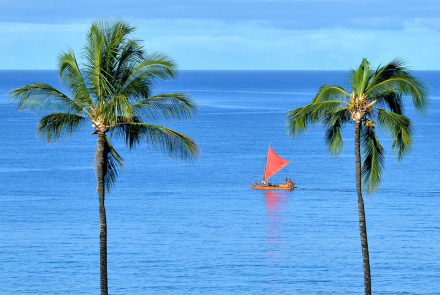
Photo by Bill Morson on Flickr
The Pacific’s year of climate, COVID-19, contestation, and cooperation
It’s been a challenging year, but the Pacific is stronger for it, Meg Keen writes.
Pacific communities have weathered a few storms this year, with national and community resilience put to the test. As we head into the Christmas holidays there is tangible relief in that a tough year is coming to a close and it’s time to be thankful for family, friends, communities and the prospect of a better year ahead.
COVID-19 has strained health systems, economies and communities across the region – but the rapid lockdown of borders across the Pacific has been impressive, even by global standards. Remarkably, Tuvalu and Nauru remain COVID-19-free. Fiji was hit hard by the pandemic with nearly 700 deaths, but its rapid and coordinated response with partners put it in a position for a controlled reopening. If successful, its model will be world-leading.
The Pacific Humanitarian Pathway-COVID (PHP-C) provides a template for local leadership and agency. It is a regional cooperation platform that has the potential to transform disaster response in the region. Research has shown there are significant gains to be made through stronger cooperative and area-based responses to the impacts of COVID-19, climate change, and economic challenges. This, however, requires broad-scale inclusion and engagement in recovery outcomes, especially at local levels.
Papua New Guinea (PNG)’s battle with COVID-19 remains of major concern, as vaccination rates and testing are still low, and hesitancy is high. It will take a ‘whole-of-community’ approach to turn the tide, but the mechanisms to initiate such a response remain weak.
Omicron and Delta show that more variants will emerge in 2022 to test systems and vaccine effectiveness. Partnerships have helped to get vaccines into countries, but have been less effective at supporting community organisations, public education, and vaccine distribution. More challenges are ahead; stronger and more diverse partnerships will be required.
One of the big events of the year was the 2021 United Nations Climate Change Conference (COP26) in Glasgow, where negotiators for Pacific Island countries (PICs) and other small island developing states led the push to keep global temperature increases below 1.5 degrees Celsius.
While many Pacific leaders were not able to attend, the region’s climate champions advocated strongly. Regional agencies provided technical support for Pacific delegates and helped to leverage global networks to push international climate action forward.
Unfortunately, commitments at COP26 fell short of the ‘1.5 to stay alive’ campaign goals, but progress was made — even if some view it as the “least-worst outcome”. Pacific nations once again demonstrated themselves to be world leaders in the fight against climate change. The gains at COP26 for adaptation support, methane reduction and climate financing are beachheads on which to build.
Geopolitics in the region also intensified with strategic manoeuvering in places like Kiribati, Solomon Islands and PNG. The year ended with the Solomons erupting into social unrest. Its leaders claimed it was all about geopolitics, but seasoned observers link the violent chaos to bigger issues of uneven development, corruption, and youth disillusionment.
The Australian Government responded rapidly to the crisis, as did the governments of Fiji, PNG and New Zealand. The intervention will bring calm for now, but more durable solutions lie elsewhere. Those with grievances need to be heard — so traditional approaches like internal dialogues and talanoas among parties that still don’t see eye-to-eye are needed. The cauldron of social unrest is still bubbling.
Elsewhere, elections in Samoa and Tonga threw up challenges and change, but both Polynesian countries weathered the political storms well. A controversial third referendum on independence in New Caledonia also recently took place. Over half of voters abstained or returned null ballots making the outcome opposing independence unconvincing, and lacking in legitimacy according to some pro-independence groups. It is unlikely this third ballot on independence will be the final word.
At the intergovernmental level, the Pacific Island Forum (PIF) had its successes with the PHP-C, and took innovative steps to advance resilience, climate action and ocean governance, but the recent leadership change led to a damaging split among members. Time, talk and concrete steps towards making the Pacific’s peak body more inclusive may heal the rift, but all members first need to step back and consider priorities for regional engagement and how they can best be advanced.
Australia has not been immune to geopolitical strains in the region, weathering deteriorating relations with China and France with spillover into the Pacific Island region. There still needs to be more dialogue about the new AUKUS arrangement to get the facts on the table, but also to explore issues related to values and security in the region.
Activity among ‘Quad’ countries in the region diversified in a positive way with cooperative moves to help distribute vaccines. However, regional platforms and multilateral engagement opportunities still need to evolve further to facilitate Pacific Island engagement in the Indo-Pacific and geopolitical dialogues. At this time of structural upheaval, dialogue and collaborative knowledge-sharing have never been more important.
At the Australia Pacific Security College, we are doing our small bit to build learning and collaboration opportunities to strengthen security capacity and enhance Pacific sustainability and prosperity.
Next year the College hopes to get back in the region to deliver some of our courses in-country, as well as work with partners to advance Pacific-led national and regional security. Now more than ever it is important to develop relationships to underpin genuine partnerships in the Pacific.
Enjoy the Christmas break with loved ones and appreciate the blessings of our region. We look forward to another year of engaging with our Pacific friends and colleagues in 2022.
Updated: 21 November 2024/Responsible Officer: Crawford Engagement/Page Contact: CAP Web Team












